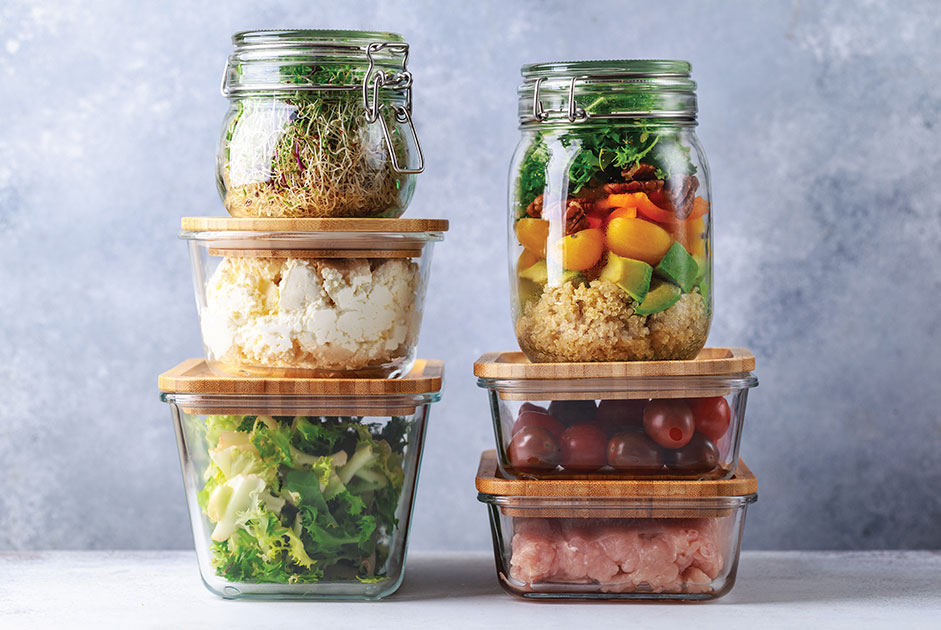So much of our health lies in our kitchen. From the foods we eat and beverages we drink to all that prep work that goes into making meals to nourish our bodies from the inside out. While we may be eating clean diets and using the best organic meats and veggies out there, we may still be using items in the prep work that make our healthy meals a little less healthy than we think.
Food Containers: Plastic is all around us in our daily lives and it may be plentiful in your kitchen, too! Plastic cups for cold foods line the grocery aisle. Deli meats, yogurt, and sour cream all come home with us in plastic containers. It may seem like a great money saver to re-use those containers for food storage, so we add them into that ever-growing cupboard of reusable plastic containers that somehow always becomes the messiest cupboard in the kitchen. We are all taught to reduce, re-use, recycle; it’s better for us, for the earth and sometimes the pocketbook. In this case, plastics are best to go right into the recycle bin, not your cupboard!
Have you ever used a plastic container to store spaghetti sauce and then find after a day or two, the container is stained orange? Or re-heated some food in a plastic container to find that the clear plastic turned white and seemed to almost cook itself? Most of us have! The reason for this is because the molecular makeup of plastic is not as solid as glass or ceramic. The plastic molecules move, and they are leaching into the foods and liquids inside them. If the spaghetti sauce can get trapped inside the molecules, you betcha’ those plastic molecules that made room for the sauce to enter the container also went right into the sauce that was poured over some pasta!
An easy solve to this is to swap out your plastics for glass. They are easy to find and will last much longer than plastic. You don’t have to worry about them melting in the dishwasher’s heat dry setting and there will be no plastic leaching into your food and eventually into your body! Any plastic marked with a “3,” “7,” “PC” or “PVC” is not BPA free [bisphenol A, an industrial chemical that has been used to make certain plastics and resins since the 1950s] so steer clear of this when purchasing foods that come in plastic containers.
Cookware: The pans we sauté and simmer in are something to consider when thinking about the chemicals that touch our food. Teflon is probably the most well-known anti-stick coating. It contains a chemical called polytetrafluoroethylene, that under high temperatures can break down and release toxic fumes right into the food it’s cooking and the air you are breathing over the stove. The good news is that many of the toxic chemicals in non-stick products have been outlawed but still, take caution if you don’t know where your pan was made.
If you want to keep using the non-stick coated pans, you can change a few cooking habits to make them safer. Reduce cooking heat to low/medium, make sure you don’t have any scratches in the coating (anything with scratches should certainly be replaced), use softer utensils vs. metal in your pans to avoid scratches (wood or silicon) and keep that pan out of the dishwasher, using only mild soap and no scrubbing. T-Fal is a brand of non-stick cookware that is known for using non-toxic coatings.
If you are open to purchasing a few new pans, you can find affordable options – you might even find it at a yard sale or a secondhand store – cast iron! It’s a great option for a non-toxic cookware material and when you oil and care for them correctly, they become your non-stick pan that can go from stove top to the oven all while getting a bit of a workout when cooking with them. Even brand-new cast iron is affordable and often can be purchased pre-seasoned and ready to use. If you care for your cast iron, it can be passed down from generation to generation due to its durability. Lodge brand cast iron is at your local Ace Hardware and they have bakeware, cookware, and even enamel-coated cast iron for a splash of color.
Stoneware is made from clay, sand, and quartz; no metals required. The caveat is the food safe coating on the stoneware, so just do your research and make sure it’s made in the good old USA and from a reputable company.



















